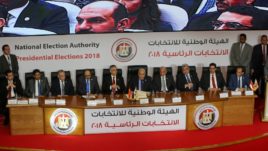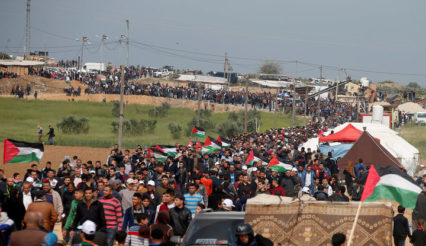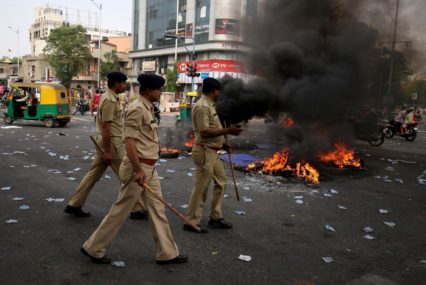|
|
This week in:
IPSI | Africa | Americas | East Asia | Europe & Central Asia | Middle East | South Asia
|
|
|
|
|
This week in Sub-Saharan Africa
|
|
|
|
|
CENTRAL AFRICAN REPUBLIC: Militia kills UN Peacekeepers and 21 others
On Tuesday, according to a UN spokesperson, predominantly Christian anti-Balaka militia members attacked a UN base in Tagbara, about 190 miles northeast of the capital Bangui, killing one peacekeeper and wounding 11 others. The ensuing gunfight lasted hours, leaving 22 anti-Balaka dead. Later, peacekeepers discovered 21 dead civilians, including four children, near a church in Tagbara; the UN has determined they had been killed in a different event. Comment: The country has faced deadly inter-religious and intercommunal fighting since 2013, when predominantly Muslim Seleka rebels seized power in Bangui. The anti-Balaka militias fought back, resulting in thousands of people killed and hundreds of thousands displaced. A 12,000-strong UN peacekeeping mission has struggled to restore order to the countryside where attacks on civilians are frequent. More than a dozen UN peacekeepers died there last year. (Voice of America, The Washington Post, Capital News, UN News)
|
|
|
|
|
|
ETHIOPIA: Abiy Ahmed sworn in as prime minister
On Monday, the parliament elected Abiy Ahmed as the country’s new Prime Minister, a week after the ruling coalition nominated him to succeed Hailemariam Desalegn. Ahmed was sworn in shortly after his election to become the country’s 16th prime minister and first Oromo to hold the top seat. Comment: The country has witnessed rising tensions amid protests from Oromo groups in the Oromiya region, and a crackdown from the government which, human rights groups say, has suppressed basic rights and freedoms. In February, the government declared its second state of emergency in two years amid the ongoing protests that effectively crippled transportation networks and forced the closure of businesses. On Saturday, government officials said that more 1,000 people were detained since the last emergency rule began. The swearing in of Ahmed is seen as an attempt to calm divisions among the ethnic groups. (Al Jazeera, CNN, Africanews, Firstpost)
|
|
|
|
|
|
SIERRA LEONE: Opposition leader wins presidential election runoff
On Thursday, according to the electoral commission, the opposition candidate Julius Maada Bio of Serra Leone People’s Party (SLPP) won the presidential election re-run against Amura Kamara. Chief Justice Abdulai Charm swore in the new leader along with Vice President Mohammed Juldeh Jalloh – mere hours after the announcement. During the ceremony, Bio pledged to govern for all Sierra Leoneans. Kamara, who’s All People’s Congress (APC) have been in power for a decade, vowed to contest the results. Comment: Kamara has seven days to petition the results in the supreme court. The election is the fourth since Sierra Leone’s brutal civil war ended in 2002. (Aljazeera, Reuters, CNN, Premium Times Nigeria, Vanguard)
Researched/Written by Brian Adienge
|
|
|
|
|
|
This week in the Americas & Caribbean
|
|
|
|
|
BOLIVIA: Ex-President found guilty for protesters deaths
On Tuesday, a jury in the United States found ex-President Gonzalo Sánchez de Lozada and his Defense Minister, Carlos Sánchez, responsible in a civil lawsuit for the deaths of 67 people and injuries to 400 more after soldiers opened fire during the 2003 protest in El Alto, Bolivia. The case was tried in the U.S. civil suits court for extrajudicial killings, under the Torture Victim Protection Act. The families of the victims were awarded USD 10 million and accepted the decision, feeling that justice had been served. Comment: Bolivia attempted to extradite the former president after he had moved to the United States following the protest deaths. The protests were primarily focused on free-market policies, particularly natural gas exports. Following his departure from Bolivia, a government vote allowed the state to regain control over natural gas in the region. (Miami Herald, U.S. News, BBC, Reuters)
|
|
|
|
|
|
COSTA RICA: Center-left presidential candidate Carlos Alvardo wins runoff election
On Sunday, center-left candidate Carlos Alvarado defeated conservative Fabricio Alvarado (no relation) in the second round of elections for the Costa Rican presidency. Though analysts predicted that the vote would be extremely close, Carlos Alvardo won with slightly more than 60 percent of the votes. Shortly after voting concluded, Carlos Alvardo reaffirmed his support for equality stating, “My commitment is to a government for everybody, in equality and liberty for a more prosperous future.” Comment: Due to the Inter-American Court of Human Rights ruling earlier this year in favor of same-sex marriage, the election in Costa Rica became a battleground for the issue. This race was expected to be closer based on the majority of polls showing that Costa Ricans oppose same-sex marriage, with a majority Catholic and socially conservative population. (NBC News, Washington Post, Reuters 1, 2)
|
|
|
|
|
|
UNITED STATES: President Trump to send National Guard to the U.S.-Mexico border
On Tuesday, President Donald Trump announced that the Department of Defense and Department of Homeland Security will work with the governors of southern border states to deploy National Guard troops to the border to aid the Border Patrol in combating illegal immigration. Both the Bush and Obama Administrations previously deployed the National Guard to assist at the border; however, President Trump said in a statement, “That’s a big step, we really haven’t done that before, or certainly not very much before.” Human rights groups such as Alliance San Diego are claiming that this military step is an “act of aggression.” Comment: Last year showed the lowest number of illegal immigrants entering the U.S. since 1971. President Trump claims he intends to use the National Guard on the border until the wall is built. (New York Times, Washington Post 1, 2, Aljazeera)
Researched/Written by Connor Murnane
|
|
|
|
|
|
This week in East Asia & Pacific
|
|
|
|
|
CAMBODIA: Government invites foreign observers to monitor upcoming election
On Wednesday, the Cambodian National Election Committee (NEC) invited international observers to monitor the upcoming election on July 29. The NEC said the registration for foreign observers will start on April 23 and go through July 25. The Committee also said that observers will have to submit written reports on their findings. Koul Panha, director of the Committee for Free and Fair Elections, an election watchdog in Cambodia, said international observers should be “cautious” of the invitation. Comment: Western countries, including the U.S. and EU, have called the coming election a “sham” and have cut electoral aid and assistance to the Cambodian government since the dissolution of Cambodia National Rescue Party on November 2017; however, Cambodian allies, including China, Japan, South Korea, and Russia, have continued to support Cambodia’s electoral process. (The Cambodia Daily, Xinhua, Reuters)
|
|
|
|
|
|
CHINA: New tariffs announced on U.S. products
On Wednesday, Beijing announced new tariffs on 106 U.S. products, a move seen by many analysts as a response to U.S. President Trump’s proposed tariffs on Chinese products. China’s proposed tariffs target USD 50 billion of American soybeans, cars, chemicals, and other goods. Chinese Vice Minister of Finance, Zhu Guangyao, said his country has no intention of a trade war, although it will never “succumb to external pressure.” Comment: Prior to this announcement, China had already responded to U.S. steel and aluminum tariffs with their own tariffs on USD three billion of U.S. pork, nuts, aluminum pipes, and other goods. (Xinhua, CNBC, NPR)
|
|
|
|
|
|
PHILIPPINES: Duterte announces his willingness to accept Rohingya refugees
On Tuesday, President Rodrigo Duterte announced in a speech to farmers and agriculture officials that “genocide” is occurring in Myanmar and that he is willing to accept Rohingya Muslims. He criticized the international community by saying “they can’t even solve the Rohingya [crisis].” Myanmar’s government spokesman rejected Duterte’s comments, saying that they do not reflect the nature of the actual situation. Comment: The United Nations and other human rights groups estimate that 700,000 people, mostly Rohingya, have fled from Myanmar into Bangladesh since August of last year when Rohingya militant attacks on the security forces sparked a military crackdown. (BDNews24, South China Morning Post, The Hindu)
Researched/Written by Edgar Peter Mutta
|
|
|
|
|
|
This week in Europe & Central Asia
|
|
|
|
|
ITALY: President seeks to overcome gridlock through coalition government
On Wednesday, Italian President Sergio Mattarella started talks with political parties to overcome the current parliamentary gridlock after the March 4 elections, in which no party won the majority. The Five Star Movement (M5S), led by Luigi Di Maio, won the most party votes and has indicated its preference to work with the Democratic Party and the League, but they do not intend to collaborate with Forza Italia because of its disagreements with the political image and goals of Forza Italia’s leader, Silvio Berlusconi. The talks could last for weeks, and the president may have to call for another election if no coalition can be made. Comment: Di Maio is a new political leader of M5S and, although the party is anti-establishment and did not join a coalition during elections, Di Maio has indicated his preference in forging a deal to gain influence in the parliament. (The Local Italy, The Guardian, Reuters)
|
|
|
|
|
|
KOSOVO/TURKEY: Kosovo deports Six Turks
On Wednesday, the Kosovar parliament voted to examine why six Turkish citizens living legally in Kosovo had been deported to Turkey last week. Kosovo Interior Minister of Affairs, Flamur Sefaj, and a Kosovo Intelligence Chief carried out the arrests and deportations of the Turks for alleged connections to Fethullah Gulen – the man Turkey claims for leading an unsuccessful 2016 coup. Kosovo Prime Minister Ramush Haradinaj claimed that he had not authorized the deportations and fired both of the responsible officials. The EU criticized Kosovo’s deportation without due process. Comment: This is the second major deportation from Kosovo in two weeks; last week, Kosovo deported Serbian official, Marko Djuric, after his alleged illegal entry. Both Kosovo and Turkey are attempting to become members of the EU, but must settle regional differences before being accepted. (Balkan Insight, Al-Monitor, Radio Free Europe/Radio Liberty, Reuters)
|
|
|
|
|
|
RUSSIA: Facebook deletes hundreds of fake Russian accounts
On Tuesday, Facebook announced that it had deleted about 270 accounts and pages controlled by a Russian “troll factory” that had posted false information. The pages and accounts are controlled by the Russian Federal News Agency, which is connected to the Internet Research Agency (IRA) in Russia. Ninety-five percent of the pages and accounts deleted were in Russian and mainly followed by people in Russia, Ukraine, Azerbaijan, and Uzbekistan. Comment: Facebook has taken this initiative to address criticisms of its transparency and security after 87 million Facebook user accounts were accessed by Cambridge Analytica for the 2016 U.S. election. The IRA has been indicted by the U.S. for its activity in the election. (Kyiv Post, BBC, Radio Free Europe/Radio Liberty, Reuters)
Researched/Written by Daniel Boerger
|
|
|
|
|
|
This week in the Middle East & North Africa
|
|
|
|
|
EGYPT: El-Sisi wins 97 percent in a nearly unopposed election
 |
|
On Monday, Egyptian President Abdel Fattah El-Sisi won 97 percent of the votes – the same proportion he secured four years ago for his first term, though official results indicate the turnout for this election was higher. The election featured only one other candidate, himself an ardent Sisi supporter, after all serious opposition contenders had halted their campaigns in January. The primary challenger was arrested and his campaign manager beaten up, while other presidential candidates withdrew, citing intimidation. El-Sisi said he had wanted more candidates to run and that he had nothing to do with the opposition withdrawals. Comment: According to Article 140 of the Egyptian Constitution, the presidential term lasts four years, and each president can only be re-elected once; however, Article 226 of the Constitution stipulates that amendments to presidential term limits are allowed if they come with further guarantees. Political activists are observing the situation in Egypt to know if El-Sisi will work on changing the current constitution so he can become eligible to run for a third term. (Aljazeera, Mada Masr, Reuters)
|
|
|
|
|
|
GAZA: Seventeen Palestinians killed, dozens wounded as thousands gather on Israel-Gaza border
|
 |
On Friday, around 30,000 Palestinians rallied throughout the Gaza Strip during the “March of Return,” a series of mass protests along the Israel-Gaza border. At least 17 Palestinians were killed and dozens wounded during clashes with Israeli soldiers. According to Reuters, a senior UN official told the Security Council on Friday that the situation in Gaza “might deteriorate in the coming days” and called for civilians, particularly children, not to be targeted. “Israel must uphold its responsibilities under international human rights and humanitarian law. Lethal force should only be used as a last resort with any resulting fatalities properly investigated by the authorities,” said UN deputy political affairs chief Taye-Brook Zerihoun. Comment: The United States has blocked a draft statement by the UN Security Council that called for an investigation into the clashes on Israel-Gaza borders. The U.S. representative to the UN, Walter Miller, argued against the investigation – reporting that “bad actors” were using the “protests as a cover to incite violence” and to “endanger innocent lives.” (Al Jazeera 1 2 3, Haaretz, Reuters)
|
|
|
|
|
|
MOROCCO: Moroccan authorities ask the UN to crack down on Polisario’s Actions in Western Sahara
On Wednesday, Morocco’s Foreign Minister Nasser Bourita said that Morocco is considering “all options” if the UN does not address its accusations that the Polisario independence movement is threatening a 1991 ceasefire in the Western Sahara conflict.” Morocco claims that the Polisario forces entered the buffer zone and were building structures in violation of the UN-brokered 1991 cease-fire agreement. Quickly responding to the Moroccan claims, the Polisario expressed their readiness to respond to any Moroccan threat toward the liberated territories. In a press statement, Mhamed Khadad, the Polisario’s coordinator with the UN, said that Morocco is trying to abandon the peace process – adding that there is no option for the country but to abide by international law. Comment: Tensions increased in Western Sahara in 2016 when Moroccan forces faced off with a brigade of Polisario forces in the remote Guerguerat area near the Mauritania border. Both sides withdrew their troops from the area last year. (MoroccoWorldNews, NorthafricaPost, Reuters)
Researched/Written by Mohamed Ismail
|
|
|
|
|
|
AFGHANISTAN: Airstrike targeting the Taliban kills civilians
 |
|
On Monday, Afghan security forces conducted a midday airstrike on a religious school in the Kunduz province resulting in the death of at least 70 people. Initially, the government stated that only Taliban fighters and commanders died in the airstrike, while eyewitnesses maintained that civilians, including children, were among the deceased. The government reported that the Taliban used the school as a training ground. The Talban denied its fighters’ presence at the school during the attack. On Tuesday, a spokesperson from the Office of the President’s Ashraf Ghani acknowledged the death of civilians in the airstrike and said that an investigation will take place. Comment: There are conflicting reports of civilian casualties with some saying that up to 100 people died. The UN mission in Afghanistan said they are, “actively looking into disturbing reports of serious harm to civilians” and reminded all parties in the conflict of their obligations to protect civilians. (Afghanistan Times, BBC News, TOLO News, Al Jazeera, New York Times)
|
|
|
|
|
|
INDIA: At least seven people killed in caste discrimination protests
|
 |
On Monday, at least seven people died during protests in central and northern India about caste discrimination led by the Dalits, the country’s most disadvantaged caste. Television footage shows police beating protestors, and protestors burning police posts, as well as attacking shops. The demonstrators were protesting against an order made by the Supreme Court last month. The order stated that arrests made in relation to the Scheduled Caste and Scheduled Tribe (Prevention of Atrocities) Act of 1989, a law meant to protect marginalized communities from discrimination and accelerate the handling of cases brought by marginalized groups, require prior approval from officials – delaying the immediate arrest of the accused. Comment: Prime Minister Narendra Modi’s government submitted a review petition to the Supreme Court on Monday, asking them to amend the order. Government data show about 90 percent of 145,000 cases involving Dalits were still awaiting trial in 2016. (Hindustan Times, Al Jazeera, BBC News, Reuters)
|
|
|
|
|
|
INDIA: Government withdraws fake news order
On Tuesday, the Information and Broadcasting Ministry withdrew their press release that had stated journalists will be stripped of their accreditations or have them suspended if they are found to have created and/or circulated “fake news.” The statement cited “the increasing instances of fake news” but did not define what constitutes fake news. This decision came one day after the ministry released the statement which received heavy criticism. Prime Minister Narendra Modi intervened – asking for the ministry to renounce their statement and let the Press Council of India, as well as the News Broadcasters Association, both independent bodies, address the issue. Comment: Commentators criticized the order by arguing that the Press Council’s ethics rules already account for the issue of journalists deliberately reporting false information. Press associations called an emergency meeting for Tuesday afternoon to coordinate a response. (The Indian Express 1, 2, Al Jazeera, The Guardian)
Researched/Written by Pamela Mhute
|
|
|
 |
|